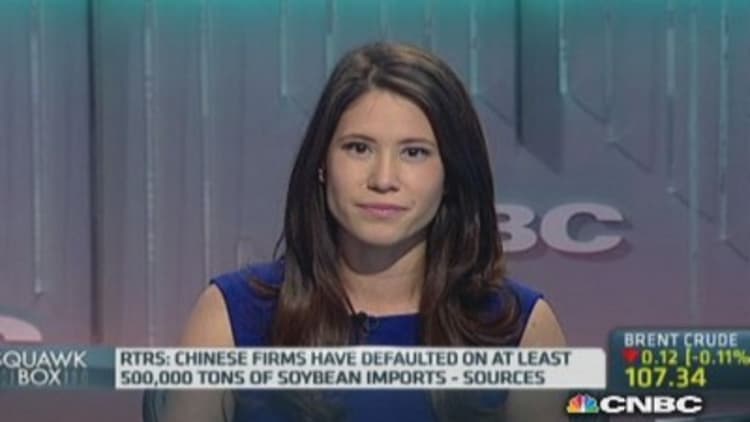
Chinese importers' defaults on soybean cargos may add to the steady drumbeat of debt concerns on the mainland, but commodity defaults aren't terribly unusual and the soybean business has been rotten for a while, analysts said.
"We've seen it before in the coal sector," said Sam Le Cornu, a senior portfolio manager at Macquarie. "It can happen in any commodity if there's a volatile move in the underlying price," he said, noting "commodity prices are very difficult to forecast with accuracy."
Read More Desperate for credit, China importers default on soy cargoes
Chinese importers defaulted on at least 500,000 tons of soybean cargos worth around $300 million recently, the most since 2004, as some companies were unable to open letters of credit with banks, Reuters reported Thursday, citing industry sources.
Some of the companies defaulting had been using soybean imports to secure cheap financing via letters of credit carrying rates as low as 2 percent, with some selling the oilseeds at a loss to use the funds for more profitable businesses, the sources said, according to the report.
When it comes to financing, any unregulated banking, such as letters of credit or trust vehicles, "you need to touch with caution," Le Cornu said, adding "the spread versus regulated (credit) should be substantial."
China's benchmark time-deposit rates, or the rates banks are paying their depositors, are around 3 percent, and banks would need to lend at rates higher than that in order to make a profit on loans. This suggests letters of credit provided at rates of 2 percent may be mispriced.
Read More China's debt problems are bad, but not Lehman bad
China's debt problems have become a major concern for investors recently. The country saw its first bond default recently, an indication the government is opting out of bailing out money-losing companies, and analysts also are concerned about the opaqueness of shadow-banking lending, especially to sectors suffering from over-capacity. The prospect of further defaults is stoking concerns over the stability of the financial system.
In addition to credit concerns, the soybean business has been dreadful for several years.
Read More Are Dr Copper's days numbered?
"It's been a difficult period (for soybean crushers) in the last two years or so basically because of the oversupply situation," said Ivy Ng, an analyst at CIMB, noting crushing capacity was over-expanded and now many players are competing for the same customers, pushing down margins.
"Soybean oil has been declining," said Helen Lau, the senior analyst covering commodities at UOB KayHian. "There's no reason to buy any extra."
Demand for soybeans has also taken a hit recently as a bird-flu outbreak spurred the culling of millions of birds at poultry farms, hurting demand for animal feed made from the oilseeds, a development that coincided with bumper crops from Latin America. With China importing about 60 percent of all the soybeans traded, the defaults by importers could also weigh on prices.
To be sure, while the defaults may be isolated within the oilseed sector, there are some concerns the credit issues may spread to other commodities.
Read More Why China doesn't have a big bond problem
Although Lau doesn't see immediate risks as traders have been able to roll over their letters of credit, she added, "we are worried about defaults on hard commodities."
"If the same thing happens in iron ore or other commodities (as with soybeans), the defaults will happen as well," she said.
She noted about 40 percent of iron ore imports are purchases made with letters of credit, with the rest paid in cash, while the bulk of copper imports are financed with letters of credit as the value is higher.
A Reuters report in March said that Chinese companies have used between 60 and 80 percent of the country's copper imports as collateral to finance other projects.
—By CNBC.Com's Leslie Shaffer; Follow her on Twitter @LeslieShaffer1

